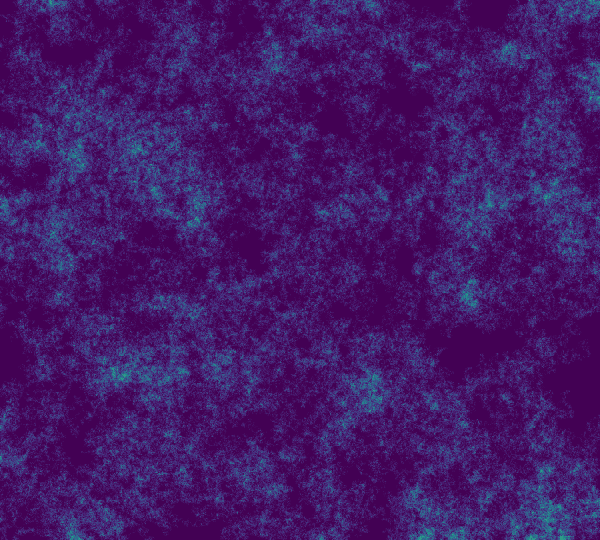r.random.walk
Performs a 2D random walk inside the computational region and returns the resulting walk.
r.random.walk [-ast] output=name [steps=integer] [directions=string] [memory=memory in MB] [seed=integer] [nprocs=integer] [nwalkers=integer] [--overwrite] [--verbose] [--quiet] [--qq] [--ui]
Example:
r.random.walk output=name
grass.script.run_command("r.random.walk", output, steps=100000, directions="4", memory=300, seed=None, nprocs=0, nwalkers=1, flags=None, overwrite=None, verbose=None, quiet=None, superquiet=None)
Example:
gs.run_command("r.random.walk", output="name")
grass.tools.Tools.r_random_walk(output, steps=100000, directions="4", memory=300, seed=None, nprocs=0, nwalkers=1, flags=None, overwrite=None, verbose=None, quiet=None, superquiet=None)
Example:
tools = Tools()
tools.r_random_walk(output="name")
This grass.tools API is experimental in version 8.5 and expected to be stable in version 8.6.
Parameters
output=name [required]
Name for output raster map
steps=integer
How many steps to take during walk.
Default: 100000
directions=string
How many directions should be used during walk.
Allowed values: 4, 8
Default: 4
memory=memory in MB
Maximum memory to be used (in MB)
Cache size for raster rows
Default: 300
seed=integer
Seed for random number generator
nprocs=integer
Number of threads for parallel computing
0: use OpenMP default; >0: use nprocs; <0: use MAX-nprocs
Default: 0
nwalkers=integer
Number of walkers.
Default: 1
-a
Perform a self-avoiding random walk
-s
Generate random seed (result is non-deterministic).
-t
Each walker starts from the same point.
--overwrite
Allow output files to overwrite existing files
--help
Print usage summary
--verbose
Verbose module output
--quiet
Quiet module output
--qq
Very quiet module output
--ui
Force launching GUI dialog
output : str, required
Name for output raster map
Used as: output, raster, name
steps : int, optional
How many steps to take during walk.
Default: 100000
directions : str, optional
How many directions should be used during walk.
Allowed values: 4, 8
Default: 4
memory : int, optional
Maximum memory to be used (in MB)
Cache size for raster rows
Used as: memory in MB
Default: 300
seed : int, optional
Seed for random number generator
nprocs : int, optional
Number of threads for parallel computing
0: use OpenMP default; >0: use nprocs; <0: use MAX-nprocs
Default: 0
nwalkers : int, optional
Number of walkers.
Default: 1
flags : str, optional
Allowed values: a, s, t
a
Perform a self-avoiding random walk
s
Generate random seed (result is non-deterministic).
t
Each walker starts from the same point.
overwrite : bool, optional
Allow output files to overwrite existing files
Default: None
verbose : bool, optional
Verbose module output
Default: None
quiet : bool, optional
Quiet module output
Default: None
superquiet : bool, optional
Very quiet module output
Default: None
output : str | type(np.ndarray) | type(np.array) | type(gs.array.array), required
Name for output raster map
Used as: output, raster, name
steps : int, optional
How many steps to take during walk.
Default: 100000
directions : str, optional
How many directions should be used during walk.
Allowed values: 4, 8
Default: 4
memory : int, optional
Maximum memory to be used (in MB)
Cache size for raster rows
Used as: memory in MB
Default: 300
seed : int, optional
Seed for random number generator
nprocs : int, optional
Number of threads for parallel computing
0: use OpenMP default; >0: use nprocs; <0: use MAX-nprocs
Default: 0
nwalkers : int, optional
Number of walkers.
Default: 1
flags : str, optional
Allowed values: a, s, t
a
Perform a self-avoiding random walk
s
Generate random seed (result is non-deterministic).
t
Each walker starts from the same point.
overwrite : bool, optional
Allow output files to overwrite existing files
Default: None
verbose : bool, optional
Verbose module output
Default: None
quiet : bool, optional
Quiet module output
Default: None
superquiet : bool, optional
Very quiet module output
Default: None
Returns:
result : grass.tools.support.ToolResult | np.ndarray | tuple[np.ndarray] | None
If the tool produces text as standard output, a ToolResult object will be returned. Otherwise, None will be returned. If an array type (e.g., np.ndarray) is used for one of the raster outputs, the result will be an array and will have the shape corresponding to the computational region. If an array type is used for more than one raster output, the result will be a tuple of arrays.
Raises:
grass.tools.ToolError: When the tool ended with an error.
DESCRIPTION
The r.random.walk module generates a 2D random walk across the current computational region. The module provides control of the number of steps and directions (4 or 8) a walker can take and allows the walker's behavior to be set to be self-avoiding (Madras et al., 1996) or allow revisits. The output displays the frequency the walker visited each cell or the average frequency. The module can run multiple walks in parallel. It either samples the same starting location for each walk or generates a unique starting position for each walker.
EXAMPLE
Using the North Carolina full sample dataset:
# set computational region
g.region raster=elevation -p
# calculate smoothed random walk from a single starting locations.
r.random.walk -at output=random_walk_smooth_paths directions=8 steps=100000 memory=1800 seed=1 nprocs=6 nwalkers=100

Smoothed random walk (Single Starting Location)
# calculate smoothed random walk from a multiple starting locations.
r.random.walk -as output=random_walk_smooth directions=8 steps=100000 memory=1800 nprocs=6 nwalkers=100

Smoothed random walk (Multiple Starting Locations)
SEE ALSO
AUTHOR
Corey T. White, NCSU GeoForAll Lab
SOURCE CODE
Available at: r.random.walk source code
(history)
Latest change: Thursday Feb 20 13:02:26 2025 in commit 53de819